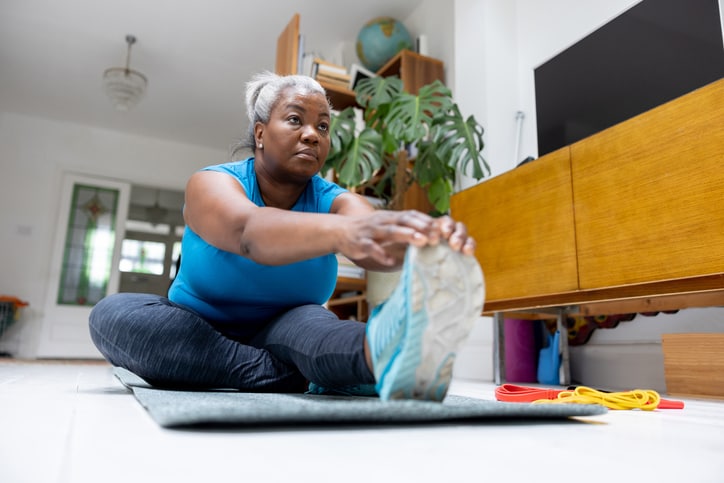When seniors start to require more help with daily needs, it’s common for them and their loved ones to feel overwhelmed and unsure about how to proceed. Often, the aim is for seniors to stay in the familiar setting of their home, while still remaining safe and well cared for. If you’re in this situation, you might be wondering if a home health aide is the right choice for yourself or an aging loved one.
“The decision to hire in-home aides often comes into play when seniors need more help than family members can or are willing to provide,” says Joy Loverde, a senior care expert and author of “The Complete Eldercare Planner, Fourth Edition.”
Whether you’re considering a home health aide for yourself or exploring care options for a loved one, here’s a closer look at what home health aides do, the benefits of this type of care and how to get a home health aide that meets your family’s needs.
What is a home health aide, and what do they do?
“Home health aides are trained to provide care and support to older adults and individuals with disabilities,” says Joanna Stolove, a licensed geriatric social worker.
Home health aides work with patients to help with activities of daily living (ADLs). ADLs refer to routine tasks, like hygiene or personal care, that people typically perform daily on their own. As people age or become disabled, they may not be able to perform basic ADLs on their own anymore.
According to Jennifer Drake, an account executive at the United Disabilities Services Foundation, a nonprofit organization that supports seniors and others with disabilities, some common ADLs that home health aides often assist with include:
- Light housekeeping.
- Meal preparation and feeding.
- Help with bathing, toileting and basic hygiene.
- Companionship.
- Transportation.
- Mobility.
“I would also add safety supervision for those who are fall risks or may have a cognitive deficit,” Drake says.
Most of the time, Loverde says, home health aides work in a client’s home; however, if a senior relocates to assisted living, a nursing home, a rehab center or hospital, sometimes a home health aide will continue to provide services in these locations. Loverde adds that some aides work with clients who need 24-hour care; these aides may even “live in” with their clients. Most home health aides come for several hours each day and then go home.
How do you know if you need a home health aide?
One of the biggest hurdles to hiring a home health aide is knowing when the time is right. After all, most seniors have been living independently for most of their adult life. There is usually a period of time when it’s unclear whether help is needed or if hiring a care provider is truly the right decision.
If you’re uncertain, here are clear signs that it’s time to consider a home health aide, according to Stolove:
- Struggling with ADLs, such as bathing, dressing, feeding or toileting.
- Health issues or physical limitations that result in increased isolation.
- Challenges with mobility, vision and/or hearing.
- Struggles with memory or routine.
- Major or subtle behavior changes, such as aggression or withdrawal.
- Inability to manage the home environment, such as mail piling up or unpaid bills.
Stolove says that when you or a loved one suspect there’s a need for assistance, it’s always good to err on the side of getting some care in place. “Hiring care early is always recommended, even if it’s just a few hours a week, as this allows the person to remain independent,” says Stolove.
Home health aides vs. medical service aids
When people refer to home health aides, they usually mean non-medical aides or personal care aides, Loverde explains. Non-medical aides are the ones who help individuals maintain a daily routine, perform basic tasks and may also drive clients to and from medical appointments.
If individuals need higher-level, medically licensed professionals to come into their home to help, they would need to hire a medical service aide. This role is different from a home health aide, Loverde notes. For example, unlike home health aides, medical service aides can:
- Provide in-home visits to treat chronic medical conditions.
- Perform wound care.
- Provide care after surgery.
- Provide care as part of a prescribed rehab plan.
What to look for in a home health aide
When you begin your search to hire a home health aide, start with the essentials. Here are some factors to consider.
Personality and demeanor
“First and foremost, you want someone who is kind and patient,” Stolove recommends. It’s also about finding someone whose personality is a good match. “While some might love an exuberant, extroverted home health aide, others might find that too much or intrusive,” she adds.
Skills and experience level
“There are home health aides with advanced training in dementia care, Parkinson’s disease, cancer and other more specialized areas of care,” Stolove says. You’ll want to consider if you or your family member has specific needs, because it’s helpful to find a home health aide with relevant experience.
Certifications and training
Some home health aides may be certified, while others aren’t, and many people wonder if certification is always needed. “It’s not always necessary to hire a certified home health aide, although it’s good practice, as you’ll know they’ve received some basic training in how to handle care,” Stolove explains.
How much does a home health aide cost?
The cost of a home health aide varies based on where you live and the particular aide you hire. You can use our Cost of Care calculator to determine the average going rate for home health aides in your area.
According to the most recent care survey by GenWorth, the national median cost for a home health aid is $6,292 per month. This rate might be higher or lower depending on where you live. You should also be prepared to adjust your home health aide’s pay based on:
- Experience level.
- Certifications, education or other qualifications.
- The scope of the job duties.
- The level of care needed.
The average cost for a home health aide hired through an agency is also likely to be higher — between $30-40 an hour, says Drake. Again, this will vary based on the agency, the aide’s skills and requirements and where you are located geographically.
Does insurance cover home health aides?
Unfortunately, insurance usually does not cover home health aide services. “One of the common misconceptions about home healthcare is that it’s covered by Medicare,” Stolove says. “Medicare provides home healthcare coverage post-hospitalization, but it’s limited in time and duration.”
Usually, home health aides are not covered by third party health insurance either, Drake says, though there are sometimes exceptions. So, what can you do if you or a loved one can’t afford the cost of hiring a home health aide? Here are some additional options:
Veterans benefits
“The Veterans Aid And Attendance Benefit may cover veteran’s spouses or widows if they meet the requirements,” Drake says.
Long-term care insurance
Long-term care insurance can cover in-home care, depending on the terms of the policy, Stolove says. Be aware, though: this insurance can be pricey, and you will need to do research to ensure the specific type of care needed is covered.
Medicaid or other government programs
Medicaid may be an option to pay for home health aides, too. “Medicaid covers the cost for home health aides, but eligibility and coverage will vary from state to state,” Stolove says. Additionally, states may have local programs devoted to covering senior care costs.
The bottom line
Hiring a home health aide can feel daunting, especially when you are just starting out. It’s helpful to take this process step-by-step, and to keep the lines of communication open with all parties involved. “Sit down with all those involved in the decision making process,” Drake suggests. “Make sure you are all on the same page for expectations and requirements.”
When it comes to selecting the right aide, Loverde says that while there are many variables to consider — if the person has the right training and background, whether they are reliable and whether they get along with you or your loved one — in the end, a basic gut-check will go a long way. “Trust your instincts,” she says.



